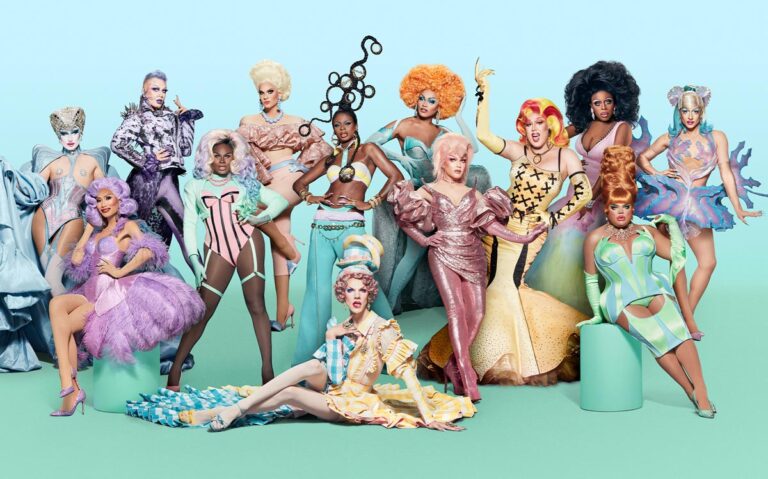‘RuPaul’s Drag Race’ is the queer community’s Olympics. What happens if it gets cancelled?

It’s no great secret that queer people have a fraught relationship with sport. I, myself, have distinct memories of standing knock-kneed on a freezing cold Sunday morning, in ill-fitting football boots, willing the football to fly anywhere but within a five-metre radius of me. Many queer people, especially gay men, share my seemingly innate disenchantment with popular sports and view them as a source of alienation from heteronormative society.
That being said, as Nelson Mandela once famously said, “Sport has the power to change the world. It has the power to inspire. It has the power to unite people in a way that little else does.” This is a pervasive truth enjoyed by people across the globe, but significantly less by queer people. A survey carried out by the Sociology of Sport Journal in 2021 found that “gay men are half as likely to be passionate sports fans compared to the 60 per cent of straight men who say that, while the 40 per cent number for lesbians mirrors that of straight women.”
There is clearly a general incongruousness between queerness and sport, although that’s not a blanket rule. A few male sporting stars have come out as gay in recent years, Joshua Cavallo being the latest high profile sportsperson to join the ‘Alphabet Mafia’ last year. Yet homophobia is still rampant in male sports, especially British football, with still no openly queer Premier League players.
On the other hand, sport has long been a comparatively welcoming institution for queer women, seeing many gay players in sports such as football/US soccer. But the ongoing institutionalised exclusion of transgender women (and men) from professional sport demonstrates the unwillingness to reconcile queer identity with its entrenched gender norms.
We are left with the paradox that sport “has the power to unite,” yet queer people are excluded. So what do we have instead? Well, it seems that the phenomenon that is RuPaul’s Drag Race is our closest bet.
As a reality-competition television series that is dubbed by its own contestants as “the Olympics of drag” or “the gay Olympics,” the parallels to professional sports are palpable. Primarily, it’s a competition. We support queens like sports fans do their teams, and we experience rounds of the competition communally in drag bars as sports fans do in stadiums.
But the most salient similarity is its cultural unification. In its peak popularity (arguably around US season 9, in 2017) it was a pretty safe bet that one could chat someone up in a queer bar and use ‘who’s your favourite queen this season?’ as an ice breaker. Not to mention the first real pandemic in 2018 that saw any calling out of “Miss Vaaaanjie” being parroted in a gleeful chorus in many a queer bar’s smoking area.
Drag Race has not only educated the mainstream straight community but also given queer people across the world a unifying cultural nucleus. It has acted as sport does for queer people who don’t really give a damn about who is topping the Premier League.
Sadly, reality TV does not have the ubiquity, longevity or financial backing to truly rival sport. While I still watch the US Drag Race and its spin offs, one can’t help but feel that its novelty is waning. Fewer and fewer of my queer friends watch it each year and despite it still having a large fanbase, one can’t help but fear its years are numbered.
Producers have been attempting to shake up the format with each passing season to maintain viewership. Gimmicks are implemented, such as the ‘golden ticket’ wildcard in the current (14th) US season that sees contestants opening a Wonka-style chocolate bar upon their elimination with the hopes they have the golden ticket allowing them to stay in the competition. Or the ‘lipstick voting’ system of the All Stars spin-off that sees queens eliminate each other (criticised by many of the recent UK vs The World spin-off viewers).
These stunts feel forced and are putting some fans off the show. While stats show that viewing figures are not rapidly declining, one can’t help but wonder what will happen if Drag Race is eventually cancelled?
Would queer culture’s place in the canon of global culture take a hit or would the archives of previous seasons be enough to perpetuate its legacy? This remains to be seen. Undoubtedly, though, the TV spot vacuum will result in the race becoming the ‘new Supreme’ of the gay Olympics.
Competition shows that mimic the challenges on RuPaul’s Drag Race, such as sewing, comedy, singing and dancing could be an appropriate replacement. One such could be the drag singing competition Queens of the Universe. Shows such as Next in Fashion (which has finally been renewed, by the way) and Legendary are contenders, with both featuring many queer contestants. But these feel unlikely, somehow…
Although these shows are entertaining, I wager that Drag Race is simply irreplaceable. The show that catapulted a niche and inherently queer artform into huge mainstream success is truly a force to be reckoned with.
That being said, we should appreciate this annual bitchy Hunger Games while we can. Drag Race is the closest we will come to a thoroughly queer equivalent to televised sport, for those who don’t partake in that. When it’s gone, it’ll be more than just a smoking area icebreaker that we’ve lost. You’ll miss it more than you think.




